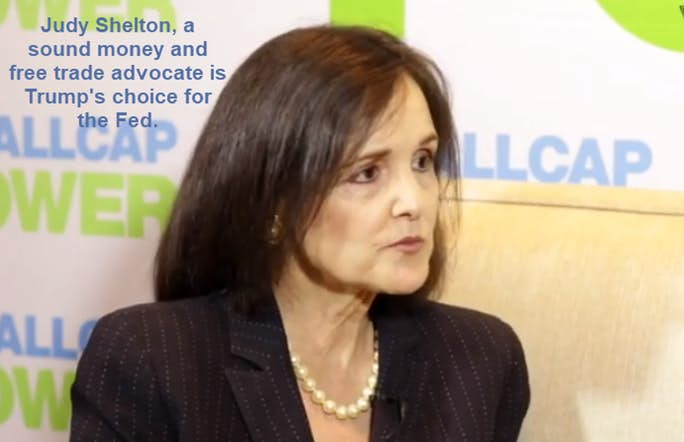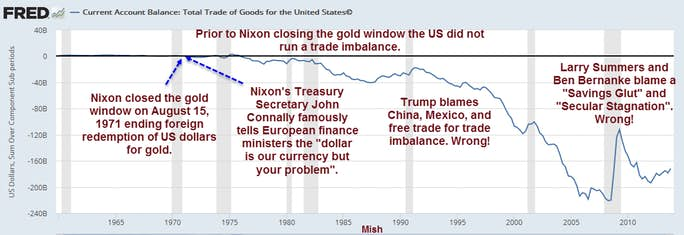
Economist Judy Shelton, a Trump economic advisor and a gold standard advocate is rumored to be Trump's next Fed pick.
Bloomberg reports White House Considers Economist Judy Shelton for Fed Board
The White House is considering conservative economist Judy Shelton to fill one of the two vacancies on the Federal Reserve Board of Governors that President Donald Trump has struggled to fill.
She’s currently U.S. executive director for the European Bank for Reconstruction and Development, and previously worked for the Sound Money Project, which was founded to promote awareness about monetary stability and financial privacy.
Case for Monetary Regime Change
On April 21, Judy Shelton had an ope-ed in the Wall Street Journal: The Case for Monetary Regime Change.
Since President Trump announced his intention to nominate Herman Cain and Stephen Moore to serve on the Federal Reserve’s board of governors, mainstream commentators have made a point of dismissing anyone sympathetic to a gold standard as crankish or unqualified.
But it is wholly legitimate, and entirely prudent, to question the infallibility of the Federal Reserve in calibrating the money supply to the needs of the economy. No other government institution had more influence over the creation of money and credit in the lead-up to the devastating 2008 global meltdown. And the Fed’s response to the meltdown may have exacerbated the damage by lowering the incentive for banks to fund private-sector growth.
What began as an emergency decision in the wake of the financial crisis to pay interest to commercial banks on excess reserves has become the Fed’s main mechanism for conducting monetary policy. To raise interest rates, the Fed increases the rate it pays banks to keep their $1.5 trillion in excess reserves—eight times what is required—parked in accounts at Federal Reserve district banks. Rewarding banks for holding excess reserves in sterile depository accounts at the Fed rather than making loans to the public does not help create business or spur job creation.
Meanwhile, for all the talk of a “rules-based” system for international trade, there are no rules when it comes to ensuring a level monetary playing field. The classical gold standard established an international benchmark for currency values, consistent with free-trade principles. Today’s arrangements permit governments to manipulate their currencies to gain an export advantage.
Money is meant to serve as a reliable unit of account and store of value across borders and through time. It’s entirely reasonable to ask whether this might be better assured by linking the supply of money and credit to gold or some other reference point as opposed to relying on the judgment of a dozen or so monetary officials meeting eight times a year to set interest rates. A linked system could allow currency convertibility by individuals (as under a gold standard) or foreign central banks (as under Bretton Woods). Either way, it could redress inflationary pressures.
Money Meltdown
Judy Shelton is author of the 1998 book Money Meltdown.
I just ordered the book to have a better idea where she is coming from.
Regardless, I am certain she would have been a better choice for Fed chair than Powell, Bernanke, Yellen, or Greenspan.
Bubbles of Increasing Amplitude
Shelton concluded "Central bankers, and their defenders, have proven less than omniscient."
Indeed.
The judgement of the Fed has produced three consecutive bubbles, each bigger than the one before it. The only reason the latest bubble is not acknowledged yet is that it hasn't yet burst.
It's not clear precisely what Shelton has in mind but at least she is headed in the right direction. What's clear is Trump is fighting the wrong battle when it comes to trade.
Tariffs will not fix the alleged problems of currency manipulation. A gold standard would.
For discussion, please see:
- Disputing Trump’s NAFTA “Catastrophe” with Pictures: What’s the True Source of Trade Imbalances?
- Mission Impossible: Tariffs Didn't Reduce the Trade Deficit (Deals Won't Either)
This material is based upon information that Sitka Pacific Capital Management considers reliable and endeavors to keep current, Sitka Pacific Capital Management does not assure that this material is accurate, current or complete, and it should not be relied upon as such.
Recommended Content
Editors’ Picks
EUR/USD rises toward 1.0700 after Germany and EU PMI data

EUR/USD gains traction and rises toward 1.0700 in the European session on Monday. HCOB Composite PMI data from Germany and the Eurozone came in better than expected, providing a boost to the Euro. Focus shifts US PMI readings.
GBP/USD holds above 1.2350 after UK PMIs

GBP/USD clings to modest daily gains above 1.2350 in the European session on Tuesday. The data from the UK showed that the private sector continued to grow at an accelerating pace in April, helping Pound Sterling gather strength.
Gold price flirts with $2,300 amid receding safe-haven demand, reduced Fed rate cut bets

Gold price (XAU/USD) remains under heavy selling pressure for the second straight day on Tuesday and languishes near its lowest level in over two weeks, around the $2,300 mark heading into the European session.
Here’s why Ondo price hit new ATH amid bearish market outlook Premium

Ondo price shows no signs of slowing down after setting up an all-time high (ATH) at $1.05 on March 31. This development is likely to be followed by a correction and ATH but not necessarily in that order.
US S&P Global PMIs Preview: Economic expansion set to keep momentum in April

S&P Global Manufacturing PMI and Services PMI are both expected to come in at 52 in April’s flash estimate, highlighting an ongoing expansion in the private sector’s economic activity.
